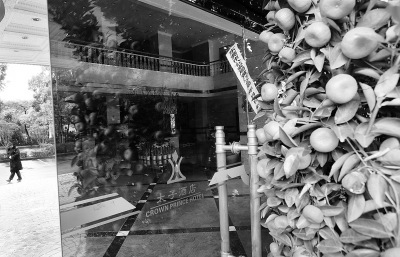Feb. 20, 2013, — The high profile crackdown on prostitution in Dongguan, Guangdong Province, has provoked some unexpected backlash. Some openly suggest at the widely felt demand for this “service,” and question if such crackdown could be more profitably directed elsewhere.

The Prince hotel in Dongguan that was reported for prostitution by China Central TV (CCTV) is now closed.
|
|
In a series of articles the People’s Daily since last Thursday condemned this attitude as a sign of moral laxity. It said that ideological emancipation is not the same as dissipation, and media should be proponents of mainstream core values.
That’s a very sensible point. Still, only a high degree of systemic toleration and permissiveness could have allowed the shady business in Dongguan to grow to its current scale. It pays to check it out. According to a report on Oriental Morning Post on February 14, in Dongguan the number of women directly engaged in this “business” is estimated at a quarter of a million.
Many of them are former assembly line workers fallen on hard times in this global factory. Sex-related business had contributed a stunning 50 billion yuan last year to local GDP. In terms of per capita disposal annual income, the highest is not Shanghai or Beijing, but Dongguan, at 42,944 yuan (US$7,040) in 2012.
Demographics
According to one insider, typically such a woman can make 340,000 yuan a year, 20 times the sum made at the assembly line.
When a shady business has expanded to this level, it sounds insincere just condemning regulatory failure.
It is necessary first to examine the hidden fractures in local demographics that occurred in tandem with the rise of the global factory.
Dongguan boasts 1.8 million people with hukou (household registration), which is dwarfed by the 7 million permanent residents (those without hukou), or the 12 million in total population.
These numbers mean a huge number of left-behind or separated spouses and children. They also suggest the challenge of assimilation and survival on the part of the migrants when this factory splutters, as it could no longer be sustained by cheap labor and cheaper resources.
Given these hidden fractures, if we continue to simply contain the discussion in purely legal terms, we would be practicing hypocrisy on a vast scale, and cannot hope to find true remedy.
For prostitution is not just a Dongguan problem. You can find it elsewhere.
Just go to the nearest massage parlor and guess what else those skimpily clad women have to offer.
Hidden fractures
Their easy availability cannot but suggest a higher degree of tolerance of this business. This tolerance is nurtured on years of ruthless celebration of material progress. In this celebration, controversial ideological differences are denigrated as pedantic and limiting.
There are fears that arguments along ideological lines may distract us from the central task of getting rich fast.
We learn to live with compromises, half-truths, selective perceptions, lies. We become more acceptable of the distance between what is preached and what is practiced. Prohibitions are no longer firmly enforced, principles become negotiable, and ethics become more or less synonymous with compliance with traffic rules. It would be counterproductive to suggest the deleterious effects of culture, especially when that culture can be transmuted into gold.
In our flirtation with market, we are steadily testing the limits of our toleration.
Our culture scene, IT-enabled, and “clicks” defined, is increasingly about money and sex. You can visit any web page for proof.
Given these complications, local surgery can be convenient. Occasionally our media do talk about core values, though it is more difficult to find a very vocal expression of those values in the cyberspace.
It is easy to launch a campaign like that in Dongguan. But unless it is followed with more substantial effort, the crackdown alone cannot exterminate the soil that gives rise to prostitution, and the pro-prostitution argument.
|
|


